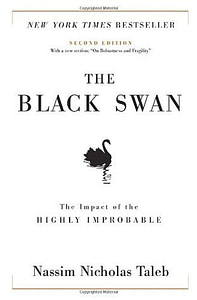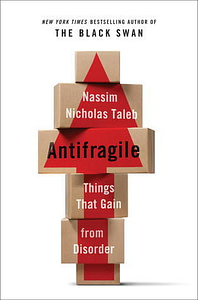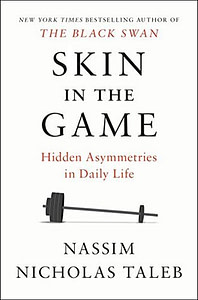You may not have heard of Nassim Taleb, but if you’ve ever heard an analyst discussing a “black swan” event, you’ve been exposed to his work. Taleb’s 2007 book “The Black Swan: The Impact of the Highly Improbable” is his best-known work but far from his only one. He is widely recognized as a writer, philosopher, and thinker, and his ideas are widely discussed in the financial world and society in general.
Before he became an author, Taleb was also a very good trader and developed a unique strategy to manage risk and benefit from unforeseen events.

Who Is Nassim Taleb?
Taleb was born in Lebanon to educated professional parents: an oncologist and an anthropologist. His family was influential in Lebanon, with a Lebanese supreme court justice and deputy prime ministers among his relatives.
Through training and early career, he is both a trader and a mathematician, with a specialization in statistics, derivative pricing, and the role of randomness. This background allowed him to hold multiple roles in risk management at firms like Deutsche Bank, BNP Paribas, and UBS.
He made most of his money during crashes, first in 1987, then in 2000. In 2007-2008, he was the chief advisor to several funds that brought returns of 65%-115%.
Nassim Taleb Core Thinking
The basis of Taleb’s thinking is the mismatch between the models used in finance and real-world real risks. He explains that many events are possible but that this non-zero probability is ignored by most observers, who rely on faulty assumptions and/or datasets.
He nicknamed such an event “Black Swans.” Until black-colored swans were discovered in Australia, we believed that all swans had to be white. It was not impossible for these birds to be black, but we built our conviction on an incomplete dataset.
The idea was detailed in his 2007 book The Black Swan: The Impact of the Highly Improbable. The book followed his 2001 Fooled by Randomness: The Hidden Role of Chance in Life and in the Markets and cemented his reputation as a foundational thinker and philosopher.

The black swan theory emphasizes that what was previously considered impossible can suddenly become a reality. It is often the ones the less aware of the black swan possibility that are the most affected.
The theory became extremely popular in financial circles over time. Its publication coincided with the 2007 crisis, when it became obvious that the risk models used by the financial industry had not correctly measured the risk of a financial crisis, leaving complex derivative products like mortgage-backed securities heavily exposed.
This idea can extend way beyond the realm of financial modeling. It has even become popular to call any surprise event a black swan. The Covid pandemic is an example, although Taleb himself sees the pandemic not as a black swan but as a sign of a society that has grown more fragile.
Other Taleb Insights
The black swan theory is Taleb’s most famous idea, but it’s far from the only one. There are other recurring themes in his thinking.
Antifragility
Most risk management systems classify things into 2 categories: fragile and robust. Fragile items or portfolios will be damaged or destroyed by external shocks. Robust systems will survive shocks, even if they might be a little dented.
Taleb argues that there is a third category he calls antifragile, which thrives in a crisis. He expands this idea far beyond portfolio risk management, discussing how it can apply to entire companies or even nations and civilizations. He elaborated further on this idea in the book Antifragile: Things That Gain from Disorder.

Skin In The Game
This is a concept he actually touched upon in a previous book but really shaped into a full concept in one of his latest publications, the book published in 2018, Skin in the Game: The Hidden Asymmetries in Daily Life.
In the book, he argues for the need for decision-makers to be directly exposed to the consequences of their decisions for society to function. He also warns, in a theme that runs through most of his books, against the “intellectual-yet-idiots,” well-educated intellectuals using complex models and thinking to arrive at blatantly wrong conclusions.

Why Does Nassim Taleb Matter?
Many of Taleb’s ideas might, on a superficial level, seems obvious. But the more you think or read about them, the more you realize how profound they are.
For example, the idea of antifragility. Should we make our society antifragile, so it thrives when facing a pandemic, a hurricane, or a war? That sounds nice but at what cost? How do you balance the need for efficiency (often coming with increased fragility) with the need for antifragility?
Or how do you account for and plan for the risk of black swans, like the war in Ukraine or maybe even a Chinese invasion of Taiwan? For that matter, do the decision-makers on these issues have “skin in the game”?
Taleb’s Style
One last thing worth noticing is Taleb’s rather unique style of communication.
He can be very sarcastic or even outright insulting to people he disagrees with. Being called a “stupid idiot” is very possible if you interact with Taleb’s Twitter profile. Random musings about the superiority of weightlifters over everyone else are also to be expected.
For this reason, he has often been criticized for being a little too confident or thinking too highly of himself. I think some of this criticism is justified; the man definitely seems to have an ego, combined with a rather aggressive style from his trading days.
I would not let that deter readers from his work. He is an insightful writer and there is plenty to learn from his work. Some of his most virulent critics have a personal beef against him after debating with him and not really enjoying the experience.
Nassim Taleb’s Opinions on Current Markets
Taleb has centered his career and philosophy around risk management, so unsurprisingly, this is mostly his concern when it comes to today’s markets.
He has stated that:
The stock market is way too overvalued for interest rates that are not 1%. I think that we may have a collapse in many, many prices
Despite his skepticism of the US stock valuations, he is even more negative about other markets: “A positive for the U.S. is it is still considered the safest place to invest with the highest credit rating.” Taleb believes things will be much worse in other countries such as Egypt, Europe, and even Japan…
Trading Using Taleb’s Method
Taleb is not actively trading anymore, so there is no fund we can analyze to see how his opinions translate into actual holdings. However, we can look back at what he did when he was a trader.
A big part of his strategy relied on options, especially deeply out-of-the-money options. This is how he made millions in the “lucky” crash of 1987, more in one day than in the previous 5 years of work.
Investors willing to learn from Taleb not only philosophy but also trading will look at his barbell strategy. The idea is to be exposed to almost exclusively low-probability events.
So you might keep some very low-risk assets, like cash, to provide safety in case of unforeseen risks and very high-risk assets, like options or derivatives, to pump up your returns, with nothing in the middle.
Needless to say, this can be a rather complex method and not for the faint of heart. It was fitting for Taleb, a mathematician, and an aggressive and technical trader who enjoyed risk-taking but would not fit the large majority of investors.
Conclusion
Nassim Taleb is a very influential thinker, and rightly so. His books have changed how millions of people understand and manage risks.
His impact has expanded far beyond finance or economics and reached into politics, sociology, and even international affairs, to the point that the term “black swan event” is overused and stretched far from its original definition.
He has also a very assertive personality and can sound like a doomsayer at times.
Still, as one of the most famous risk experts in the world, we should listen to his warnings, keep ourselves ready for the inevitable black swans, and maybe even make our lives, portfolios, and society more antifragile.
The post Investor Profile: Nassim Taleb appeared first on FinMasters.
FinMasters